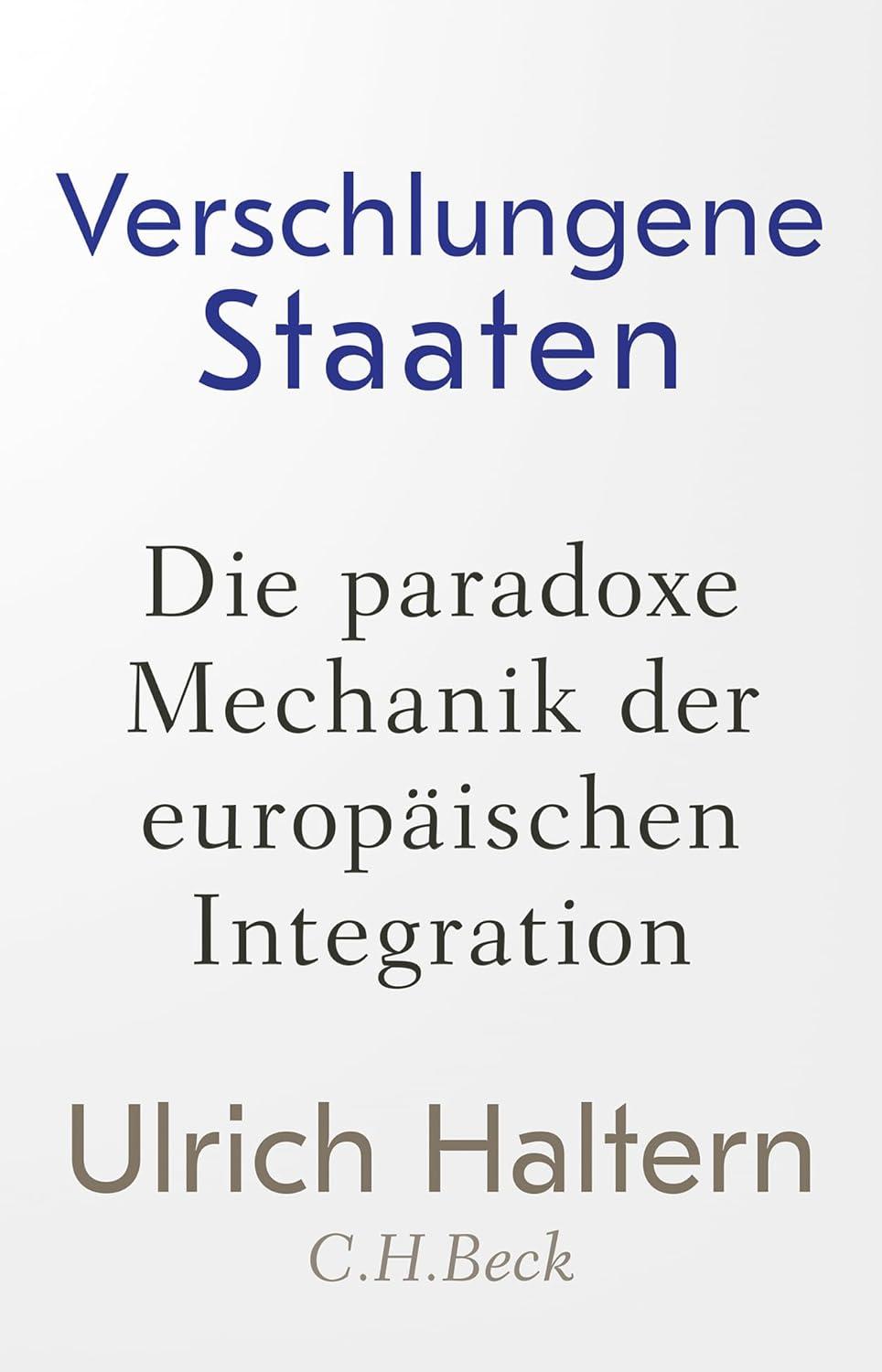The unique nature of the European Union

 C.H. Beck
C.H. BeckUlrich Haltern | Verschlungene Staaten: Die paradoxe Mechanik der europäischen Integration (Entangled States: The Paradoxical Mechanics of European Integration) | C.H. Beck | 303 pages | 38 EUR
In the autumn of 2024, the publisher C. H. Beck sent me its list of new publications for 2025. As someone who has long held a federal European state as the minimum for European self-assertion in the 21st century, I couldn't ignore Ulrich Haltern's book Verschlungene Staaten: The Paradoxical Mechanics of European Integration. Ulrich Haltern is Professor of Public Law, European Law and Philosophy of Law at Ludwig-Maximilians-Universität in Munich. He has written many books, including a multi-volume standard work on European law. I am not a lawyer. So I asked the publisher whether the professor's new book was also readable for non-lawyers. I was told: yes, of course.
The answer should have been "yes and no". As a trained historian who wrote his master's thesis on the beginnings of European integration, I have always viewed the development of the European Union from a historical and political perspective. I have never seriously considered the legal side. Ulrich Haltern has taught me otherwise. He made it clear to me that the European Union is first and foremost a legal union. This is actually obvious, due to the fact that EU Europeans are still largely unaware that they form not only a geographical and cultural unit, but also a historical and political one. Or could do, if only they wanted to. This is why law and jurisdiction are the most important foundations of the EU.
The book certainly has a long history and period of development behind it. However, the introduction addresses the current global political situation. The fifth word in this introduction is Donald; the sixth, Trump. There is talk of the climate crisis, refugee flows, the consequences of the pandemic and technological change, of global political upheaval and the crumbling of the Pax Americana and the European peace order. And of drawing new maps reflecting the spheres of interest of the major powers. This is where I found myself objecting, but only here. For me, the global redistribution of power on our planet is far more than just a shuffling of chairs, climate change far more than just a crisis. And I have regarded the Pax Americana as a thing of the past for some ten years now, even if we Europeans as a whole couldn't see this. Only since Donald Trump pulled the US nuclear shield away overnight, has a slow awakening from sweet slumber begun.
Ulrich Haltern rightly notes that geopolitical considerations have remained alien to the European Union's thinking about itself as a whole, and that the EU has no convincing narrative that goes beyond mere utility. As French, Germans, Belgians, Italians, Poles, etc., we enjoy a good grumble about bad national policies and bad governments, but we would never question the raison d'être of our fatherlands. The European Union is different. There is still no motherland Europe. The EU has to prove its usefulness to all its states and citizens time and again in order to be recognized. The author repeatedly demonstrates this very clearly in every chapter.
In four chapters, Ulrich Haltern examines the foundations, constitutionalization, regulation and effectuation (as a lawyer calls the practical application of law) from the perspective of law, politics and culture, both historically and in its current form. This broad approach, even if it sometimes goes into too much detail for non-lawyers, characterizes the strength of this book. He repeatedly emphasizes the gap between the power to rule and the legitimation of rule, "because regulatory power gets by with fewer legitimation resources than redistributive power". He clearly identifies where the democratic deficits of the EU lie.
In principle, the gap arises from the fact that the individual has less weight as part of a larger entity, that citizens have no "influence on any kind of ..
Two strands determine the politics of European integration: the national legal strand and the European legal strand. Both are closely linked in a double helix. This beautiful image also implies that the two strands do not touch directly. The interaction takes place in the space between. This is where a game and a battle between national, intergovernmental and supranational legal systems takes place. Ulrich Haltern calls it the "crowded space". It is a narrow space occupied by many positions. The European Court of Justice (ECJ) has been able to almost constantly expand supranational rights since a fundamental ruling in 1963, when a Dutch transport company succeeded in having excessive national import duties withdrawn before the ECJ. The member states have often simply accepted this, but just as often explicitly accepted or even demanded it, because generally, it has increased the functionality and common benefits within the community of states.
Tension and ambivalence are the keywords of this state of affairs. According to Ulrich Haltern, the result is often "policy without politics" at EU level and "politics without policy" at member state level. I understand this to mean that the EU very often sets the framework of a policy, but does not have the full democratic substructure, while the member states have this, but can no longer determine the framework.
Cf. the review on L.iteratur.Review on Robert Menasse's The World of Tomorrow: A Sovereign Democratic Europe - and its Enemies)
The development of European law and the current state of the functional mechanics of the European Union make it abundantly clear that the officially desired "ever closer union of the peoples of Europe" (from the preamble of the currently valid Lisbon Treaty) has reached a hurdle that, if jumped over, would mean finally abandoning national sovereignty and the merging of nation states into a federal state. Given that a decisive narrative for this is missing, since neither the nation states nor large sections of the European population want this, the author doubts whether this will succeed.* Nevertheless, he is not without hope. The replacement of the last remnants of the right of veto is already being discussed. The internal market and its structure is still the core of European integration, in which the right of veto of individual member states no longer exists. Nevertheless, the financial crisis and the Covid crisis led to measures (e.g. the Stability Fund) that were previously unimaginable. The need to redevelop the European defense capability is being intensively discussed due to Russian neo-imperialism.
For the lawyer Haltern, the EU legal community is unique. In his introduction, he writes: "Moreover, it seems an irony of history that ultra-modern European integration, which has left behind the dusty mechanisms and ideas of international law, is now being driven forward by the intrusion of atavistic political violence." Failure of the EU is possible. It, the member states and the European citizens must find the strength to establish a European identity as the basis of their statehood. Not taking this path would probably be tantamount to Europe giving up on itself. The circumstances demand that the EU also obtain the "power of the purse" and the "power of the sword", i.e. the power of disposal over its own financing as well as over external and internal security. The way to achieve this is open to debate. Should a European identity develop first or a federal state in which a European identity then develops? It's like the question of the chicken and the egg. Only one thing is clear: as it currently stands, the European Union will not be able to control the future.



